外研版-英语-八上-外研版导学案:Module2 1单元 第一课时
外研版-英语-八上-八上Module2 3单元 导学案:第一课时

八上Module 2 Unit 3 导学案:第一课时一、学习目标:1. 复习并学会灵活运用本模块重点词汇和句型2. 巩固熟练运用本模块所学知识比较不同物品或地点的差异,并描述自己的家乡二、学习重点:通过复习巩固熟练运用本模块重点词汇和句型比较不同物品或地点的差异三、学习难点:灵活运用本模块所学知识描述自己的家乡课前预习一、使用说明与学法指导:1. 自主复习Unit 1, 2的重点词汇和句型2. 熟背Unit 1的对话和Unit 2的文章,有疑惑的地方用红笔标记并在组内探讨解决二、教材助读:1. 理解并熟读本单元Language practice部分的句子,尝试总结有关比较级的用法2. 自主学习课本语法部分关于本模块的知识三、预习自测(一) 回顾完成下列表格:单音节及部分双音节形容词比较级的变化规则:条件变化举例1. 一般的形容词2. 以不发音的字母e结尾的形容词3. 以重读闭音节“辅+ 元+ 辅”字母结尾的形容词4. 以“辅音字母+ y”结尾的形容词(二) 回顾总结句型:1. 比较级的常用结构及含义:___________________________________________________________________________ _例句:______________________________________________________________________ 2. 同级比较的结构及含义:____________________________________________________________________________ 例句:_______________________________________________________________________四、我的疑问:_____________________________________________________________________________ _____________________________________________________________________________课内探究一、情景导入:借助Language practice中的句子回顾本模块重点二、质疑探究(一) 句型总结评讲预习自测部分,巩固有关比较级的语法及句型(二) 逐步完成本单元练习,巩固词汇和句型的运用三、当堂检测(一) 用所给词的适当形式填空1. Tom is as _____________ (careful) as his sister.2. Shanghai is ____________ (big) than Tianjin.3. I’m older than he is. But he is a little _____________ (tall) than I am.4. He feels ____________ (happy) today than yesterday.5. The river is ____________ (wide) than that one.(二) 根据提示完成句子1. In China there are many cities with a p___________ of more than one million.2. Hongkong has seven ____________ (百万) people.3. Tony is taller t___________ me.4. I will go to my ___________ (家乡) next weekend.5. The mountain is two k____________ high.6. Taiwan is a beautiful ____________ (岛屿) of China.7. London is the _______________ (首都) city of the UK.8. There are lots of famous cities on the ____________ (海岸) of China.9. Guilin is a beautiful city, _______________ (尤其) the lakes and low mountains.10. Cambridge is a ______________ (受欢迎的) city in the UK.四、课后反思__________________________________________________________________________________________________________________________________________________________课后训练(一) 单项选择( ) 1. It’s ______ hot in Chongqing in summer. If it doesn’t rain, it will be much _____.A. quite, hotB. very, hotC. much, hotterD. very, hotter ( ) 2. The city is famous ______ its beautiful places.A. toB. asC. ofD. for( ) 3. Tom is _______ than any other student in our class.A. the tallestB. tallerC. tallD. tallest( ) 4. The city is very hot in summer _______ very cold in winter.A. andB. soC. orD. but( ) 5. After practicing for several months, I can swim much _____ now.A. slowerB. slowestC. fasterD. fastest( ) 6. ----The skirt is too expensive.----Look! Here is another one . It’s ______ and nicer.A. dearerB. cheaperC. olderD. longer( ) 7. The population of the UK is _______ than that of China.A. largerB. smallerC. lessD. more( ) 8. _______ trees are planted in our home town every year.A. Millio ns ofB. Million ofC. MillionD. Two millions(二) 根据汉语提示完成句子1. 这把尺子跟那把尺子一样长。
新外研版八年级英语上册Module1 Unit2(第一课时)教学案
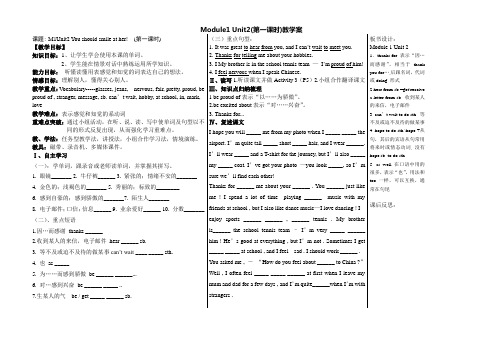
Module1 Unit2(第一课时)教学案课题: M1Unit2 You should smile at her! (第一课时)【教学目标】知识目标:1、让学生学会使用本课的单词。
2、学生能在情景对话中熟练运用所学知识。
能力目标:听懂读懂用表感觉和知觉的词表达自己的想法。
情感目标:理解别人,懂得关心别人。
教学重点:V ocabulary-----glasses, jeans, nervous, fair, pretty, proud, be proud of , stranger, message, sb. can’t wait, hobby, at school, in, mark, love教学难点:表示感觉和知觉的系动词重难点突破:通过小组活动,在听、说、读、写中使单词及句型以不同的形式反复出现,从而强化学习重难点。
教、学法:任务型教学法,讲授法,小组合作学习法,情境演练。
教具:磁带、录音机、多媒体课件。
Ⅰ、自主学习(一):学单词,跟录音或老师读单词,并掌握其拼写。
1. 眼镜_______2. 牛仔裤______3. 紧张的;情绪不安的_______4. 金色的;浅褐色的_______5. 秀丽的;标致的________6. 感到自豪的;感到骄傲的_______7. 陌生人_______8. 电子邮件;口信;信息______ 9. 业余爱好______ 10. 分数_______ (二)、重点短语1.因…而感谢thanks ______2.收到某人的来信,电子邮件hear ______ sb.3. 等不及或迫不及待的做某事can’t wait ____ _____ sth.4. 也as _____5. 为……而感到骄傲be ______ ______...6. 对…感到兴奋be ______ _____ ..7.生某人的气be / get _____ ______ sb. (三)重点句型:1.It was great to hear from you, and I can’t wait to meet you.2.Thanks for telling me about your hobbies.3.I My brother is in the school tennis team —I’m proud of him!4.I feel nervous when I speak Chinese.Ⅱ、读写1.听读课文并做Activity 3(P5)2.小组合作翻译课文Ⅲ、知识点归纳梳理1 be proud of表示“以……为骄傲”。
外研版英语八年级上第二模块第一课时导学案
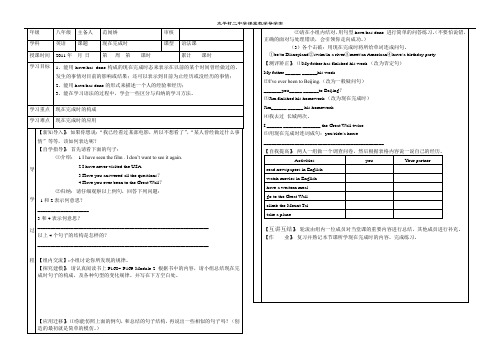
太平村二中学课堂教学导学案年级八年级主备人范闻娇审核学科英语课题现在完成时课型语法课授课时间2011年月日第周第课时累计课时学习目标1、能用have/has done构成的现在完成时态来表示在以前的某个时间曾经做过的、发生的事情对目前的影响或结果;还可以表示到目前为止经历或没经历的事情;2、能用have/has done的形式来描述一个人的经验和经历;3、能在学习语法的过程中,学会一些区分与归纳的学习方法。
学习重点现在完成时的构成学习难点现在完成时的应用导学过程【新知导入】:如果你想说:“我已经看过某部电影,所以不想看了”,“某人曾经做过什么事情”等等,该如何表达呢?【自学指导】:首先请看下面的句子:⑴介绍:1.I have seen the film . I don’t want to see it again.2.I have never visited the USA.3.Have you answered all the questions?4.Have you ever been to the Great Wall?⑵归纳:请仔细观察以上例句,回答下列问题:1和2表示何意思?____________________3和4表示何意思?___________________________________________________________________以上4个句子的结构是怎样的?___________________________________________________________________【组内交流】:小组讨论你所发现的规律。
【探究建模】:请认真阅读书上P168~ P169 Module 2 根据书中的内容,请小组总结现在完成时句子的构成,及各种句型的变化规律。
并写在下方空白处。
【应用迁移】:⑴你能仿照上面的例句,和总结的句子结构,再说出一些相似的句子吗?(创造的最初就是简单的模仿。
外研版-英语-八上-外研版:Module1 2单元 导学案2018春)
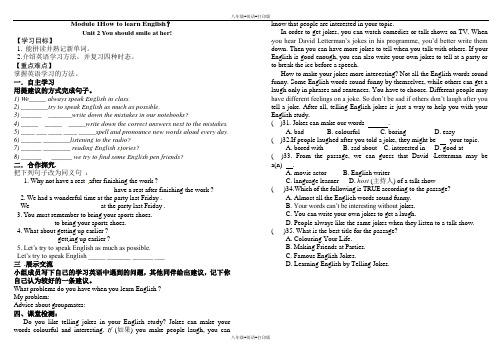
八年级-英语-打印版八年级-英语-打印版Module 1How to learn English ?Unit 2 You should smile at her!【学习目标】1. 能拼读并熟记新单词。
2.介绍英语学习方法,并复习四种时态。
【重点难点】掌握英语学习的方法。
一.自主学习用提建议的方式完成句子。
1) We_____ always speak English in class.2) ________try to speak English as much as possible.3) ______ _______write down the mistakes in our notebooks?4) _____ _____ _____write down the correct answers next to the mistakes. 5) ____ ___ ____ ____ _____spell and pronounce new words aloud every day. 6) ______ ________listening to the radio? 7) ______ ________ reading English stories?8) ______ ______ we try to find some English pen friends? 二.合作探究.把下列句子改为同义句 :1. Why not have a rest after finishing the work ?______ ______ ______ have a rest after finishing the work ? 2. We had a wonderful time at the party last Friday . We ______ ______ at the party last Friday . 3. You must remember to bring your sports shoes. _____ _____ to bring your sports shoes. 4. What about getting up earlier ? ______ _____ gett ing up earlier ?5. Let’s try to speak English as much as possible.Let’s try to speak English _____ _______ ______ _____ ______ 三 .展示交流小组成员写下自己的学习英语中遇到的问题,其他同伴给出建议,记下你自己认为较好的一条建议。
外研版英语八年级上册全册导学案版本2

外研版初中英语八上全册导学案Module 1 How to learn English全模块教案II. Teaching material analyzing 教材分析本模块以“How to learn English”为话题,以学习征求建议、提出建议的方法为主线,介绍了单词分类记忆、根据上下文判断词义;听力细节辨认、反向推理;略读等学习方法。
通过模块学习,学生除了能掌握上述英语学习方法之外,还可以根据同学的建议制定更适合自己的学习计划;同时,模块也复习了一般现在时、现在进行时、一般过去时、一般将来时的用法。
Unit 1 通过听、读、说训练,初步学习给别人提建议的方法。
其中活动1要求将所给表示学习活动的词汇分类;活动2要求根据录音判断对话主题;活动3—5听读包含建议的对话并完成填表、答问等任务。
活动6学习英语中的连读法;活动7根据提示口头练习给别人提建议的方法。
Unit 2 通过读、写训练,学会向别人征求建议或给别人提出建议。
其中活动1要求学生列举自己在语言学习活动中遇到的实际困难。
活动2—4要求学生阅读一语言学习网站“问答专栏”中内容后完成补全句子、回答问题等练习。
活动5—6要求学生根据自己的学习实际,完成一封求助信并征求同学的建议。
Unit 3 对“提供学习建议”的功能项目进行综合训练,并在此基础上完成制定学习计划的任务。
其中活动1、2 要求听取Charlie和Mary的对话,选出所听到的表示建议的句式并完成问答练习。
活动3—5 要求根据所供图片,描述、评论Jack的学习、生活情况,并根据提示问题提出建议。
活动6要求阅读Helen的问题并用所供表达完成Simon的回信。
活动7—9是词汇的拓展训练:其中7要求根据图片写出单词;8用所供词汇组成短语;9用所供词汇完成句子。
Around the world给学生介绍了通过多种渠道学习英语的方法。
Module task 要求学生反思自己的英语学习,通过图标明晰信息,并根据图标信息制定学习计划;然后小组交流,提出修改建议。
外研版-英语-八上-外研版:Module2 1单元 导学案2018春)

八年级-英语-打印版八年级-英语-打印版 Module 2 My home town and my country Unit1 It’s taller than many other buildings. 【学习目标】1. To understand the conversation about the comparison of two cities2. To talk about and compare two different cities or places 【重点难点】能根据情境,运用本单元的新词汇和句型及语法。
一.Oral EnglishA: Is your home town bigger than Shenzhen? B: No, it isn’t , It’s smaller than Shenzhen. A: What’s the population of Shenzhen? B: It’s over ten million. 二.自主学习 Ⅰ.在课文中找出下列词组,进行默写。
1.在海岸上,沿海 __________2.在香港的附近 _____________3. 变得重要 ___________4. 变得更大更繁华______________5. 和香港一样繁荣 _________6. 许多其他城市 ________________7. 记得去参观 ___________8. 许多其他建筑 ________________ 三.合作探究.(1)Where did Daming go during the weekend?_______________________________________________ (2)What’s the p opulation of Shenzhen? _____________________________________________ (3)What is the tallest building in Shenzhen ? _______________________________________________ (4)Is Hong Kong older than Shenzhen? ______________________________________________ (5)Is Shenzhen getting bigger and busier? ________________________________________________ 四.展示交流 读对话完成关于深圳的文章。
外研版-英语-八上-外研版英语八上Module2 1单元 导学案

Module2 My home town and my countryUnit1 It’s taller than many other buildings.(A1,A4,A5) Period1自主学习课前诊断一.温故知新Task1.Read and translate these words .1.hill_____________2.population_____________3.wide________________lion ______________5.high_____________6.river_________________7.metre_________________8.552 metres high_________________________9.3 metres wide_______________10.9 metres long _____________________ 11. the Victoria Peak. _____________二.设问导读Task 1 look at the pictures and talk about them. Before listening.Task2. Listen and finish A1 While listening.Task3 Look at the pictures. Work in pairs. .After listening.1 A: Where is it in Picture1 ?B: It’s …A: What’s the population of Shanghai ?B: It’s…A:How high is the Jin Mao Tower ?B:It’s ...A:How long is the Huangpu River ?B:It’s ...2.A:Where is it in Picture 2?B: It’s …A: What’s the population of Hongkong ?B: It’s…A:How high is theVictoria Peak ?B:It’s ...Task 4 Let’s compareEg, Jin Mao Tower is taller than theVictoria Peak .(Say more sentences like this )Task 5 A4Task6 A5三.自学检测按要求拼写单词(课课练P7,A1)互动学习问题解决1.He is _____ than his father. 他比他的父亲高。
第一课时外研版英语八年级上册Module2Unit1优秀教学案例

1.作业布置:我会布置一些与课堂内容相关的作业,让学生们巩固所学知识。例如,让学生们用一般将来时的被动语态写一篇关于未来机器人的短文。
2.作业反馈:我会对学生们提交的作业进行评价,给出具体的反馈和建议。例如,评价“你的作业表达清晰,语法正确,但可以在词汇运用上更加丰富,希望你在今后的学习中加强词汇积累。”等。
五、案例亮点
1.创新的情景创设:本节课通过视频导入和科幻故事的方式,创新性地创设了未来科技世界的情景,使学生们能够身临其境地学习英语。这种情景创设的方式不仅激发了学生的好奇心,还使他们能够更加直观地理解课文内容。
2.问题导向的学习方式:通过自主探究和小组讨论,学生们在解决问题的过程中,不仅能够深入理解一般将来时的被动语态,还能够培养他们的批判性思维和团队合作能力。这种问题导向的学习方式使学生们能够主动参与课堂,提高学习效果。
2.科幻故事:我会设计一个与课文内容相关的科幻故事,让学生们通过角色扮演的方式,参与到故事情节中。这样既能让学生们运用所学知识进行实际操作,又能提高他们的口语表达能力。
3.情境模拟:我会设计一些模拟情境,让学生们在实际情境中运用英语进行交流。例如,模拟一个未来家庭,让学生们扮演家庭成员,用英语进行日常对话。
2.科幻故事:我会讲述一个与课文内容相关的科幻故事,引发学生对机器人的兴趣。故事可以围绕一个家庭,讲述他们与机器人助手一起生活的情景,让学生在轻松愉快的氛围中对课文内容产生期待。
(二)讲授新知
1.语法讲解:我会用生动的语言和实例,讲解一般将来时的被动语态。通过对比过去时和现在时的被动语态,让学生清晰地区分一般将来时的被动语态,如“People will be cared for by robots in the future.”。
外研版八年级英语上Module1Unit2导学案
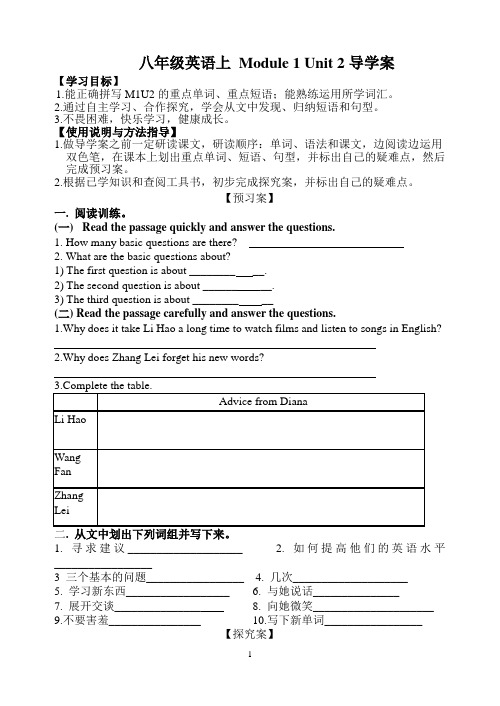
八年级英语上Module 1 Unit 2导学案【学习目标】1.能正确拼写M1U2的重点单词、重点短语;能熟练运用所学词汇。
2.通过自主学习、合作探究,学会从文中发现、归纳短语和句型。
3.不畏困难,快乐学习,健康成长。
【使用说明与方法指导】1.做导学案之前一定研读课文,研读顺序:单词、语法和课文,边阅读边运用双色笔,在课本上划出重点单词、短语、句型,并标出自己的疑难点,然后完成预习案。
2.根据已学知识和查阅工具书,初步完成探究案,并标出自己的疑难点。
【预习案】一. 阅读训练。
(一)Read the passage quickly and answer the questions.1. How many basic questions are there?2. What are the basic questions about?1) The first question is about ________ __.2) The second question is about ______ __.3) The third question is about ________ __(二) Read the passage carefully and answer the questions.1.Why does it take Li Hao a long time to watch films and listen to songs in English?2.Why does Zhang Lei forget his new words?plete the table.Advice from DianaLi HaoWangFanZhangLei二.从文中划出下列词组并写下来。
1. 寻求建议____________________2. 如何提高他们的英语水平_________________3 三个基本的问题_________________ 4. 几次____________________5. 学习新东西__________________6. 与她说话_______________7. 展开交谈_______________ 8. 向她微笑_____________________ 9.不要害羞________________ 10.写下新单词_________________【探究案】1.认真阅读Unit1&unit2课文,思考以下问题,并在课本上标注这些重点句子。
八年级英语上册 Module 1 Unit 2 Please help me导学案1 外研版

八年级英语上册 Module 1 Unit 2 Please help me导学案1 外研版help me (第1课时)【学习目标Teaching Objects】XXXXX:1、基础目标: some words and phrases in this unit2、发展目标:to understand the problems in learning English and the advice given to improve English3、拓展目标:How to solve t his problems in students’own words【教学重点 Teaching Important Points】Improve students’reading ability and know some questions of learning English、【教学难点 Teaching Difficult Points】How to solve the problems、【课前预习】I、根据所给单词及句型完成句子:1、许多学生想要得到一些提高英语的建议。
( askfor ,about)2、看英语电影是学英语的一种好方法。
( a good way, watch English films)3、不要害羞,尽量去大声地说。
( shy, try to, speak loudly)4、请把这些纸放在你的书包里。
( place…in, pieces of paper)5、你应该通过深呼吸来放松自己。
( relax by, take a deep breath)II、用方框中所给单词的适当形式填空。
check, smile, correct, listen, match, numberYou can improve your English by _____ to English songs、Can you _____ from one to one thousand in English?The teacher asked us _____ the mistakes in the paper、Your tie doesn’t _____ with your suit、 _____ is a language、 It can always help you、【课堂活动】Step1、Review Review the words and the phrases in unit1、Make a conclusion of English learning( 见PPT)Step2、 Lead in Ask some questions, ask the students to answer them(something about English learning)Step3、 Listening Listen to the tape and answer some questions、1、How many questions are there in English learning?2、what are they?Listen again, and answer some other questions1、when you shy to speak English, what can you do?2、How to remember the vocabulary?Step4、 Read the paragraph,and choose T or F( )1、You can use “how old are you” to start a talk、( )2、 Change new words often after you place them in the bedroom、 ( )3、 When you finish a song or a film, try to think about all the new words、( )4、 Smiling can help you speak in front of the class、Step5、 Read the paragraph again,and complete the sentences, ask some students to finish it on the blackboard、1、Li hao takes a long time to watch films and listen to songs in English because___________________________________________、2、To learn English,the language doctor thinks li hao should_________________________________________________________ ____________3、Sam is often shy when___________________________________________、4、The language doctor advices Sam to_______________________________________________________ 5、5、Oliver forgets his new vocabularybecause__________________________________________________ __________6、The best way to learn vocabulary is to_________________________________________________________ __________Step6、 Read the paragraph and underline the phrases they don’t understand, then explain some of them、1、ask for advice_______________2 、 three basic questions____________3、 like/enjoy doing sth、 ________________ enjoy oneself_____________4、 It takes sb、 some time to do sth、__________________________5、 spend time/money (in)doing sth、 __________________________6、 pay for__________7、It’s a great way to do sth、_________8、 talk about sth、_________________9、 talk with sb、 ___________10、 the meaning of_________________11、take a deep breath____________12、 start a conversation___________________________13、 want to do sth _____________ would like to do sth、___________14、 Smiling always helps、________________________________15、 all the time_________ Step7、 Exercise、一、适当形式填空1、I enjoy___________ (read)books、2、 This is a great way ____________(learn)English3、 How about _________________ (count)the English words、二、首字母填空1、Take a deep b__________ before you speak English2、 There is a p___________ of paper on the floor、3、 You can e___________ yourself when you sing songs、4、 Many students ask for advice abouti______________(提高) their English, there are threeb__________(基本的)questions、5、 Say the words when you see them, and c_______(改变) them every day、 Step8、 Homework Copy the words and the phrases in this unit、【当堂反馈】回想本节课所学内容,你学到了哪些?你还有什么疑问?_________________________________________________________ _________________________________________________________ _________________________________________________________ _____________________________【教师课后反思】。
第一课时外研版英语八年级上册Module2Unit1教学设计

4.词汇作业:收集并整理本节课所学的核心词汇和短语,制作成单词卡片,以便随时复习。
目的:加强学生对词汇的记忆,提高词汇运用能力。
5.课后反思:请学生思考本节课所学内容,总结自己在课堂上的表现,包括优点和不足之处,并提出改进措施。
目的:培养学生的自我反思能力,激发学习动力。
注意事项:
1.作业布置要适量,确保学生能在课后合理安排时间完成。
2.教师应鼓励学生认真完成作业,注重作业质量,培养良好的学习习惯。
3.教师在批改作业时,要及时给予反馈,指导学生改正错误,提高学习效果。
4.针对不同学生的特点,教师可适当调整作业难度和要求,以满足个体需求。
2.学生分享在本节课中的收获和感悟,教师给予肯定和鼓励。
3.教师强调团队精神的重要性,教育学生学会合作、互相帮助。
4.布置课后作业,要求学生巩固所学知识,并进行适当的拓展阅读。
五、作业布置
为了巩固本节课所学知识,提高学生的英语综合运用能力,特布置以下作业:
1.写作作业:请学生结合课文内容,编写一篇关于自己参加运动会或体育比赛的经历的短文。要求运用一般现在时和现在进行时,使用不少于5个本节课所学的核心词汇和短语。字数在80-100词左右。
-建议学生进行角色扮演,将所学内容以对话形式表演出来,提高口语表达能力。
-鼓励学生进行阅读拓展,了解与课文相关的背景知识,拓宽视野。
4.教学评价:
-采用形成性评价和终结性评价相结合的方式,全面评估学生的学习成果。
-关注学生在课堂上的表现,如参与度、合作意识、语言运用能力等,及时给予反馈。
-定期组织测试,了解学生对知识的掌握程度,为教学调整提供依据。
难点:学生对一般现在时和现在进行时的区别与运用,以及在实际语境中正确使用词汇和短语进行有效沟通。
外研版八年级英语上册导学案C层 Module 2 U1-1
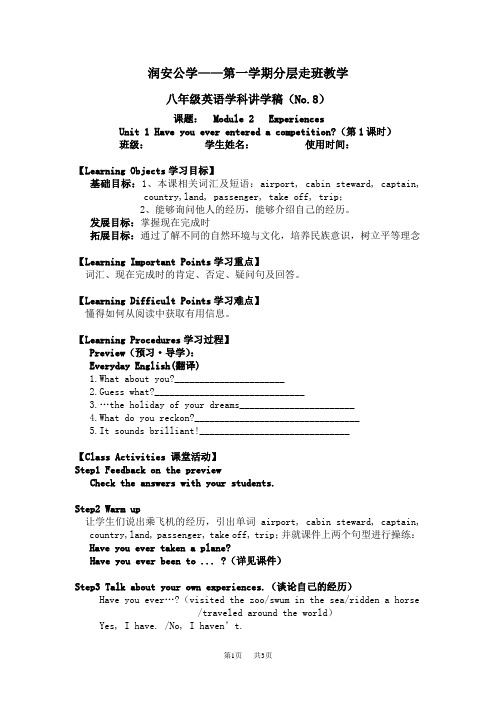
润安公学——第一学期分层走班教学八年级英语学科讲学稿(No.8)课题: Module 2 ExperiencesUnit 1 Have you ever entered a competition?(第1课时)班级:学生姓名:使用时间:【Learning Objects学习目标】基础目标:1、本课相关词汇及短语:airport, cabin steward, captain, country,land, passenger, take off, trip;2、能够询问他人的经历,能够介绍自己的经历。
发展目标:掌握现在完成时拓展目标:通过了解不同的自然环境与文化,培养民族意识,树立平等理念【Learning Important Points学习重点】词汇、现在完成时的肯定、否定、疑问句及回答。
【Learning Difficult Points学习难点】懂得如何从阅读中获取有用信息。
【Learning Procedures学习过程】Preview(预习·导学):Everyday English(翻译)1.What about you?______________________2.Guess what?______________________________3.…the holiday of your dreams_______________________4.What do you reckon?_________________________________5.It sounds brilliant!______________________________【Class Activities 课堂活动】Step1 Feedback on the previewCheck the answers with your students.Step2 Warm up让学生们说出乘飞机的经历,引出单词airport, cabin steward, captain, country,land, passenger, take off, trip;并就课件上两个句型进行操练:Have you ever taken a plane?Have you ever been to ... ?(详见课件)Step3 Talk about your own experiences.(谈论自己的经历)Have you ever…?(visited the zoo/swum in the sea/ridden a horse/traveled around the world)Yes, I have. /No, I haven’t.Step4 Match the words with the pictures.(搭配词语和图片)(详见课件)Step5 Do Activity 3.Listen and readPre-listening questions(听对话,回答下面的问题):1、Where has Lingling wanted to go?2. What’s the first prize of the competition?Step6 Do Activity 4.Check the things Lingling and Sally have done.Step7 ExercisesI. 请根据句意及所给首字母提示补全所缺单词,使句意完整通顺。
2022年外研版八上《Module 2 Unit 1 》导学案
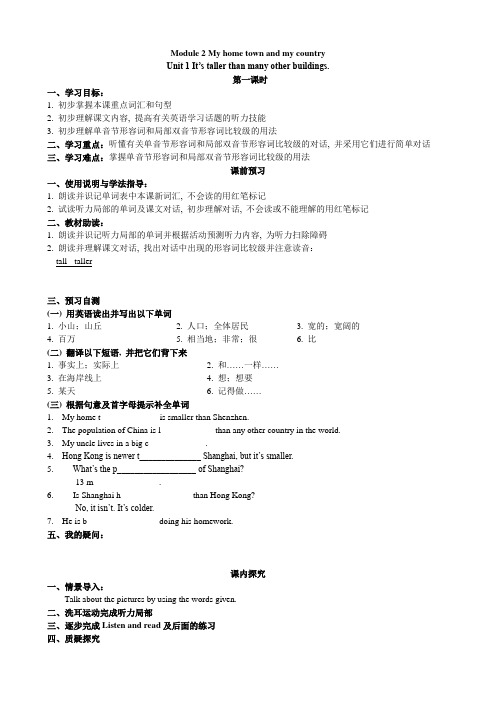
Module 2 My home town and my countryUnit 1 It’s taller than many other buildings.第一课时一、学习目标:1. 初步掌握本课重点词汇和句型2. 初步理解课文内容, 提高有关英语学习话题的听力技能3. 初步理解单音节形容词和局部双音节形容词比较级的用法二、学习重点:听懂有关单音节形容词和局部双音节形容词比较级的对话, 并采用它们进行简单对话三、学习难点:掌握单音节形容词和局部双音节形容词比较级的用法课前预习一、使用说明与学法指导:1. 朗读并识记单词表中本课新词汇, 不会读的用红笔标记2. 试读听力局部的单词及课文对话, 初步理解对话, 不会读或不能理解的用红笔标记二、教材助读:1. 朗读并识记听力局部的单词并根据活动预测听力内容, 为听力扫除障碍2. 朗读并理解课文对话, 找出对话中出现的形容词比较级并注意读音:tall - taller______________________________________________________________________________________________________________________________________________________________________________________________________________________________三、预习自测(一) 用英语读出并写出以下单词1. 小山;山丘2. 人口;全体居民3. 宽的;宽阔的4. 百万5. 相当地;非常;很6. 比(二) 翻译以下短语, 并把它们背下来1. 事实上;实际上2. 和……一样……3. 在海岸线上4. 想;想要5. 某天6. 记得做……(三) 根据句意及首字母提示补全单词1.My home t_____________ is smaller than Shenzhen.2.The population of China is l____________ than any other country in the world.3.My uncle lives in a big c_____________.4.Hong Kong is newer t______________ Shanghai, but it’s smaller.5.--- What’s the p__________________ of Shanghai?--- 13 m_______________.6.--- Is Shanghai h________________ than Hong Kong?--- No, it isn’t. It’s colder.7.He is b________________ doing his homework.五、我的疑问:__________________________________________________________________________________________________________________________________________________________课内探究一、情景导入:Talk about the pictures by using the words given.二、洗耳运动完成听力局部三、逐步完成Listen and read及后面的练习四、质疑探究熟读以下句子, 思考讨论其中包含的语言点:It’s taller than many other buildings.How was your weekend?It’s getting bigger and busier.Some day, it will become as busy as Hong Kong.What’s the population of Shenzhen?五、当堂检测Work in groups. Make dialogues talking about your hometown and another city.六、课后反思_____________________________________________________________________________ _____________________________________________________________________________课后训练一、根据汉语提示完成句子.1.Shenzhen is a busy city __________________ (靠近) Hong Kong.2.--- How was your weekend?--- _______________ (相当) good.3.It’ll become ________________________ (和……一样繁华) Hong Kong .4.What’s the ______________________ (人口) of China ?5.Her father is ______________________ (超过) 50 years old .二、合作探究1. 熟读对话并在组内分角色朗读或进行角色扮演2. 组内合作找出对话中比较级的句子, 并勾划出比较级的单词课后学习指导:朗读对话注意语音语调, 并注意比较级的拼读第二课时一、学习目标:1. 熟练掌握本课重点词汇句型, 并能准确、熟练写出单音节及局部双音节形容词的比较级2. 能听懂和理解比较不同物品或地点的话题, 培养听力技能3. 能用比较级进行有关描述不同物品或地点的简短对话, 培养对家乡的热爱之情二、学习重点:掌握单音节及局部双音节形容词比较级的用法三、学习难点:通过对话学会采用比较级描述不同的物品或地点课前预习一、使用说明与学法指导:1. 通过语音训练拓展日常交际用语2. 通过对话表演方式大胆开口, 能用英语进行有关比较不同物品或地点的交流3、观察对话总结单音节及局部双音节形容词比较级的变化规那么以及它们的发音二、教材助读:朗读并理解语音局部的词句, 注意语音语调三、预习自测(一) 写出以下单词的比较级形式:big - ____________ small - ____________ new - ____________ old- ____________ wide- ____________ busy - ____________ large - ____________ tall- ____________ clean - ____________ (二) 大声朗读以上单词, 组内相互纠正读音四、我的疑问:_____________________________________________________________________________ _____________________________________________________________________________课内探究一、情景导入Work in pairs. Talk about your hometown and another city.二、按要求完成语音局部注意单音节和局部双音节形容词比较级的发音三、质疑探究(一) 通过本课的学习, 归纳运用以下句型结构, 翻译并相互练习:1. 形容词比较级+ than ... “__________________________〞2. as + 形容词原级+ as ... “__________________________〞(二) 知识要点探究1. —How was your weekend? 你周末过得怎么样?—Pretty good! 相当好!此处pretty意为“相当地〞, 作副词, 修饰形容词good;pretty还可以作形容词, 意为“漂亮的, 可爱的〞. 牛刀小试:Betty is a pretty girl with golden hair. 翻译:________________________________ In Western countries, the age is pretty personal information for women.翻译:_________________________________________________________________2. In fact, it only became important in the 1980s. It’s getting bigger and busier.事实上, 它只是在20世纪80年代变得重要起来. 它正变得更大、更繁华.① in fact 意为“事实上〞, 一般单独使用, 可放在句首、句中或句末.牛刀小试:_______ _______, Taiwan is a part of China. 事实上, 台湾是中国的一局部.② in the 1980s意为“__________〞, 因此, 表示“在某世纪某年代〞的结构为:_________________.牛刀小试:Lin Zexu was born _____________________ and died _________________________.林那么徐生于18世纪80年代, 卒于19世纪50年代.③ become important“变得重要〞, get bigger and busier“变得更大、更繁荣〞. 其中become与get都作连系动词用, 表示“变得〞, 后面可接形容词、名词作表语, 一起构成系表结构.拓展:英语中最常用的系动词是be动词牛刀小试:He ________ ________ ________ when he left school. 毕业后, 他成为了一名演员.My hometown is _________ bigger and __________. 我的家乡正变得更大、更干净.3. It’s taller than many other buildings. 它比其它许多建筑更高.Its streets are much wider and cleaner too. 它的街道也宽得多、干净得多.① “many other + 可数名词复数〞表示“其它许多……〞牛刀小试:Tony comes from England, but _______ _______ ________ in his school come from China. 托尼来自英国, 但是他学校其他许多学生来自中国.② “形容词比较级+ than ... 〞表示“比……更……〞, 这是比较级的常用结构.比较级前面可以用much修饰, 表示“更……;……得多〞.牛刀小试:The capital city is _________ _________ many ________ ________.首都比其它许多城市更繁华.The population of India is ________ ________ than that of Australia.印度人口比澳大利亚人口多许多.4. Some day it will become as busy as Hong Kong, I’m sure.“as + 形容词/副词原级+ as ...〞表示“和……一样……〞, 这是同级比较的结构.注意:在“as ... as... 〞的结构中形容词、副词只能采用原级, 不能用比较级.牛刀小试:He is _______ _______ _______ his brother. 他和他的哥哥一样高.This book is ______ ________ ______ I think. 这本书和我想的一样有趣.拓展:“as ... as...〞的否认结构“not as ... as ...〞常常翻译为“不像/不如……那样……〞.牛刀小试:Tom doesn’t study as hard as his brother. 翻译“______________________________〞5. —What’s the population of Shenzhen? 深圳人口是多少?—It’s over ten million, I think. 我想是一千多万.① million 数词“百万〞, 它跟hundred, thousand用法一样, 最常用两种结构:基数词+ hundred / thousand / million “……百/千/百万〞〔注意:thousand和million前面的基数词可以是十及以上的数字〕hundreds / thousands / millions of ... “数百/数千/数百万的……〞牛刀小试:翻译数字:3,000 ____________________________________________________10,000 ___________________________________________________65,000 ___________________________________________________430,000 __________________________________________________1,000,000 ________________________________________________9,600,000 ________________________________________________7,580,000 _________________________________________________②询问某地人口的结构是:“______________________________________________〞, 答复直接用“_____________________________〞.牛刀小试:翻译对话:——四川有多少人口?_________________________________________________——八千多万. _________________________________________________________6. 小组合作学习课本语法局部关于本模块比较级的变化规那么四、当堂检测写出以下形容词的比较级:1. short — __________2. thin —__________3. early —__________4. red — ___________5. fine — __________6. fat — ___________7. cool — __________ 8. big — ___________ 9. heavy — ________五、课后反思__________________________________________________________________________________________________________________________________________________________课后训练一、单项选择1. _________, this pen is longer than that one.A. One dayB. In factC. Pretty good2. — Is Hong Kong ________ than Shanghai?— Yes, it is.A. newB. newerC. newest3. — Is the dog _________ than that one?— Yes, it is.A. bigB. bigerC. bigger4. The yellow coat is as ______ as the purple one.A. cheapB. heavierC. cheaper5. The population of Guilin is not as _________ as that of Shanghai.A. biggerB. smallerC. larger6. —What’s the ______________ of China?—___________ over 1,300,000,000A. people; They’reB. population; It’sC. population; There’re7. At the end of the 20th century, ____________ African people moved because the war.A. Four millionsB. MillionsC. Millions of二、组内合作, 编一那么对话介绍北京和你家乡的不同, 合作练习第一课时一、学习目标:1. 初步掌握本课重点词汇和句型2. 初步理解课文内容, 提高有关英语学习话题的听力技能3. 熟悉给别人提建议的方法二、学习重点:通过对话初步掌握给别人提建议的方法三、学习难点:理解并初步掌握对话中出现的提建议的各种句型课前预习一、使用说明与学法指导:1. 朗读并识记单词表中本课新词汇, 不会读的用红笔标记2. 试读听力局部的单词及课文对话, 初步理解对话, 不会读或不能理解的用红笔标记二、教材助读:1. 朗读并识记听力局部的单词并根据活动预测听力内容, 为听力扫除障碍2. 朗读并理解课文对话, 找出对话中提出建议的句子:_____________________________________________________________________________ _____________________________________________________________________________ _____________________________________________________________________________ _____________________________________________________________________________ 三、预习自测(一) 用英语读出并写出以下单词1 . 语法2 . 使完全3 . 句子4 . 改正5 . 拼写6 . 练习7 . 词典8 . 字母9 . 理解、明白10 . 建议11 . 应该12 . 发……的音13 . 大声地14 . 电台, 播送15 . 关键性的16 . 主要的17 . 极好的, 优秀的(二) 翻译以下短语, 并把它们背下来1 . 查阅, 查找2 . 犯错误3 . 写下, 记下4 . 同意某人5 . 需要做某事6 . 像……一样重要7. 联系做某事8. 给某人建议四、我的疑问:_____________________________________________________________________________ _____________________________________________________________________________课内探究一、情景导入:What does English include (包含)?How do you learn English?Do you have any advice for learning English well?二、洗耳运动完成听力局部三、逐步完成Listen and read及后面的练习四、质疑探究熟读以下句子, 组内相互练习, 并思考讨论其中包含的句子结构:1 . We should always speak English in class.2 . Let’s try to speak English as much as possible.3 . Why not write down the mistakes in our notebooks?4 . Don’t forget to write down the correct answers next to the mistakes.5 . It’s a good idea to spell and pronounce new words aloud every day.6 . How about listening to the radio?7 . You just need to listen for key words and main ideas.]8 . Why don’t we try to find some English pen friends?五、当堂检测一、根据句意及汉语提示完成单词.1 . Could you please speak again ? I can’t u______________ you .2 . Li Mei __________________ (练习) speaking English every morning .3 . There are 26 l__________________ in English .4 . Let’s try to speak English as much as P__________________ .5 . ________________ (完成)the sentences with the correct form of the words .6 . Lin Shuhao is an ____________________ (优秀的) basketball player in NBA.7 . Could you tell me how to ____________________ (发音) the word ?8 . You should read English newspapers ___________________ (大声地) .9 . The ________________ (播送) says that it is going to rain tomorrow .10 . What’s the ___________________ (主要的) idea of this passage ?二、用所给词的适当形式填空.1.Why don’t you _________________ ( listen ) to the radio now ?2.What’s the Chinese _________________ ( mean ) of this word ?3.I’m sorry your _________________ ( spell ) is wrong again .4.Jack made a few __________________ ( mistake ) in the English exam .5.Little Tom wants to know the __________________ ( pronounce ) of this word .六、课后反思_____________________________________________________________________________ _____________________________________________________________________________课后训练一、单项选择( ) 1. Miss Liu gave us _________ about how to learn English.A . some advice B. some advices C. a good advice D. an advice ( ) 2. Here are some phone numbers. Please __________ in your notebook.A. write down themB. write them downC. write down itD. write it down( ) 3. If you don’t know the word, you can find its ____________ in the dictionary.A. translateB. to translateC. translatingD. translation ( ) 4. __________ make a birthday card for her?A. Why don’tB. How aboutC. Let’sD. Why not ( ) 5. __________ playing computer games?A. Why notB. Shall weC. How aboutD. Why don’t you ( ) 6. It’s bad for you to copy(抄袭) others’ homework . __________ do it again.A. Don’t tryB. Not try toC. Try not toD. Try not二、按要求完成以下各题.1 . Let’s read an English newspaper every day. (改为同义句)___________ __________ reading an English newspaper every day?2 . You should drink more water. (改为否认句)You ___________ ____________ drink more water.3 . Why don’t you walk to school? ( 改为同义句)____________ ______________ walk to school?4 . Spelling new words every day is a good idea. (改为同义句)____________ a good idea ___________ spell new words every day.5 . 我们应该相互帮助. (根据汉语提示完成句子)We ___________ help ____________ ____________.课后学习指导:仔细理解课文对话, 熟读并在组内分角色朗读第二课时一、学习目标:1. 熟练掌握本课重点词汇和句型2. 能听懂和理解与英语学习相关的话题3. 熟练掌握给别人提建议的方法二、学习重点:通过对话学会给别人提建议三、学习难点:通过对话学会给别人提建议课前预习一、使用说明与学法指导:1. 通过语音训练拓展日常交际用语2. 通过对话表演方式大胆开口, 能用英语进行有关英语学习话题的交流3、观察对话总结给别人提出建议的方法二、教材助读:1. 朗读并理解语音局部的句子, 注意语音语调2. 通过提示试着理解活动七的题意并思考该活动三、预习自测根据汉语提示翻译以下句子:1. 我们为什么不把他们写下来呢?________________________________________________2. 你应该及时(in time)纠正练习中的错误. __________________________________________3. 每天读英语报纸是一个好主意. _________________________________________________4. 经常检查你的词汇笔记本怎么样?______________________________________________5. 尽量不要将查阅每一个单词. ___________________________________________________6. 非常感谢, 托尼. ______________________________________________________________7. 玲玲经常帮助他的妈妈做家务. _________________________________________________8. 这是一个好主意. _____________________________________________________________9. 我们需要尽可能多地读英语报纸. _______________________________________________10. 别忘了每天听播送. __________________________________________________________四、我的疑问:_____________________________________________________________________________ _____________________________________________________________________________课内探究一、情景导入思考:How can we give others some advice?二、按要求完成语音局部两个活动三、质疑探究(一) 通过本课的学习, 归纳运用以下句型结构, 并相互练习:1. Why don’t we / you …?2. We / You should …3. It’s a good idea to …4. How about …?5. Let’s try to …6. Do n’t forget to ...(二) 知识要点探究1. Why don’t we try to find some English pen friends? 我们为何不尽量找一些英国笔友呢?Why not write down the mistakes in our notebooks? 为何不在我们的笔记本里记下错误呢?1〕这里Why don’t we do…? 是用来表示提出某种建议, 而不是询问为什么不做某事的原因. 其简略形式为: Why not do…? 如:Why don’t you ask the teacher? = Why not ask the teacher? 为何不问问老师呢?2〕也可以用What about / How about…? 来提出建议, about为介词, 后接名词或动名词-ing形式. 如:What about taking little Tom along with us?3〕还可以用Would you like…? 来提出建议, 意为“你想要…吗?, would like 后可接名词或动词不定式. 如: Would you like a cup of tea? 你想要杯茶吗?Would you like to go and see her? 你想要去见她吗?牛刀小试:如果我们要提建议“我们去散步〞, 在英语中可有这几种表达法:____________________________________________________________________________________________________________________________________________________________________________________________________________________________________________________________________________________________________________________2. What else? 还有什么吗?else为形容词, 意为“别的;其他的〞, 一般放在特殊疑问词或不定代词的后面. 如:Who else did you see at the meeting? 你在会上还看到谁了?Dose anyone else want to read this book? 还有其他人想要看这本书吗?other也表示“其他的〞, 但只能用于修饰名词并放在名词前. 如:Did you see other classmates? 你看到其他同学了吗?They left early and other friends left late. 他们很早就离开了, 其他朋友离开得晚.牛刀小试:English is difficult for him, but nothing ________ is.对于他来说英语很难, 但其他没有什么是困难的.I will finish my homework first and then do ___________ things.我将首先完成家庭作业, 然后做其他事情.3. It’s a good idea to spell and pronounce new words aloud every day.每天大声拼读新词是一个好主意.句中it 是形式主语, 后面的动词不定式短语to spell and pronounce new words aloud every day是真正的主语.注意:在“ It is + adj.+ of / for sb. + to do sth.〞句型中, 假设形容词是描述不定式行为发出者的性格、品质的, 如:kind, good, nice, right, wrong, clever, careful, polite等, 介词用of;假设形容词仅仅是描述事物的特征, 如:difficult, easy, hard, important, dangerous等, 介词那么用for. 如:It’s very kind of you to help me. 你能帮我真好.It’s clever of you to finish the exercises so quickly. 你真聪明, 这么快就完成了这些联系.牛刀小试:It’s very dangerous _______ children to cross the busy street.对孩子来说, 穿过这条交通繁忙的街道是危险的.It’s difficult _______ us to finish the work. 对我们来说, 完成这项工作很困难.It’s a good way ___________ down the new words. 记下新词是一个好方法.4. Let’s try to speak English as much as possible. 我们尽可能多地说英语吧.try to do sth. 表示“尽力/努力做某事〞. try (not )to do sth. 表示“尽力(不要)做某事〞. 如:类似的结构还有:ask sb. (not) to do sth. 叫某人〔不要〕做某事;tell sb. (not) to do sth. 告诉某人〔不要〕做某事.拓展:try还可以接动词的-ing形式表示“尝试、试图做某事〞. 如:You should try learning a new language. 你应该试试学一门新的语言.牛刀小试:翻译句子:这学期我们将努力学好所有学科. ______________________________________________ Jack正在试着用筷子(chopsticks). ______________________________________________ 请告诉贝蒂不要等我. _______________________________________________________ 你叫丽莎买一份报纸了吗?__________________________________________________ 结构“as ... as possible〞表示“尽可能……〞, 相当于“as ... as sb. can / could〞.牛刀小试:Please write back ________ ________ ________ _________. 请尽快回信.Mrs Black gave me ________ ________ help ________ ________.布莱克夫人给予我尽可能多的帮助.Jane finished the work as quickly as possible. (转换同义句)Jane finished the work __________ __________ _________ __________ _________.四、当堂检测(一) 用单词的适当形式填空:1. The _____________ (spell) of the word is not right.2. It’s not a good idea to learn English by _______________ (translate).3. My grandfather always reads some _______________ (newspaper) before breakfast.4. There are all kinds of _____________ (radio). Which one do you like?5. The boy wasn’t careful and he made some ______________ (mistake) in his homework.(二) 用方框内适当单词的正确形式填空correct, match, term, message, excellent, number, orchestra1. Kate said, “I should study hard this ____________.〞2. How about ____________ the right pictures with the letters?3. Could you please help me find out the ___________ spelling of this word?4. David is an ___________ student in our school ____________.5. My sister isn’t at home. Can I take a ____________ for you?五、课后反思_____________________________________________________________________________ _____________________________________________________________________________课后训练一、单项选择( ) 1 . Miss Liu gave us _________ about how to learn English.A . some adviceB . some advicesC . a good adviceD . an advice ( ) 2 . Here are some phone numbers, please __________ in your notebook.A . write down themB . write them downC . write down itD . write it down( ) 3 . If you don’t know the word , you can ____________ in the dictionary.A . look up itB . look after itC . look it upD . look for them ( ) 4 . __________ make a birthday card for her?A . Why don’tB . How aboutC . Let’sD . Why not ( ) 5 . Don’t forget _________ the door when you leave home.A . closeB . closedC . closingD . to close ( ) 6 . __________ playing computer games?A . Why notB . Shall weC . How aboutD . Why don’t you ( ) 7 . It’s better __________ early in the morning.A . startB . to startC . startingD . started ( ) 8 . I think English is as ___________ Chinese.A . important asB . important thanC . more important thanD . important ( ) 9 . It’s bad for you to copy others’ homework . __________ do it again.A . Don’t tryB . Not try toC . Try not toD . Try not ( ) 10 . It will be sunny soon. You don’t need __________ an umbrella .A . to takeB . takeC . takingD . took二、按要求完成以下各题.1 . Let’s read an English newspaper aloud. (改为同义句)___________ __________ reading an English newspaper aloud?2 . You should drink more water. (改为否认句)You ___________ ____________ drink more water.3 . It’s a good idea to write new words in groups.(对画线局部提问)___________ ____________ a good idea?4 . Why don’t you walk to school? ( 改为同义句)____________ ______________ walk to school?5 . Spelling new words every day is a good idea. (改为同义句)____________ a good idea ___________ spell new words every day.。
外研版八年级上册 Module 1 Unit 2 You should smile at her导学案(新版)外研版

Module 1 How to learn EnglishUnit 2 You should smile at her.第一课时一、学习目标:1. 初步掌握本课重点词汇和句型2. 通过快读和细读理解课文大意并找出细节信息,提高有关英语学习话题的阅读技能3. 熟悉文中出现的多种提建议的表达二、学习重点:通过阅读文章熟练掌握给别人提建议的方法三、学习难点:理清文章逻辑并理解文章基本内容课前预习一、使用说明与学法指导:1. 朗读并识记单词表中本课新词汇,不会读的用红笔标记2. 试读课文篇章,试着理解,不会读或不能理解的用红笔标记二、教材助读:1. 预习课本活动一、二,试着理解文章大意并朗读2. 理清文章的结构,思考如何处理关于英语学习一类话题的写作三、预习自测(一) 用英语读出并写出以下单词1 . 改进,改善2 . 主要的,基础的3 . 向……提出意见4 . 羞怯的,腼腆的5 . 谈话,交谈6 . 快地,迅速地7 . 合理的,合乎常理的 8 . 建议,提议(二) 翻译以下短语,并把它们背下来1 . 请求(给予)2 . 建议某人做某事3 . 喜欢做某事4 . 害怕(不敢)做某事5 . 对某人微笑6 . 忘记做某事7 . 不要害羞 8 . 开始对话四、我的疑问:_____________________________________________________________________________ _____________________________________________________________________________课内探究一、情景导入:Work in pairs. Talk about problems you have with English.二、分层阅读文章,逐步理解基本内容1. Read fast to understand the main idea and the structure of the passage.2. Read carefully to understand the details.三、质疑探究熟读下列句子,组内相互练习,并思考讨论其中包含的句子结构:1. I like watching English films and listening to English songs.2. Watching films and listening to songs are great ways to learn English!3. I also advise you to talk about the films or songs with your friends.4. I’m shy and I am afraid to speak to her.5. These are good ways to start a conversation.6. And before you begin, you should smile at her!7. The third question is about vocabulary.8. I suggest you write four or five words a day on pieces of paper and place them in your room.四、当堂检测一、用英语复述文章大意_______________________________________________________________________________ _______________________________________________________________________________ _______________________________________________________________________________ _______________________________________________________________________________ _______________________________________________________________________________ _______________________________________________________________________________二、根据句意及汉语提示完成单词1.There are four ____________ (主要的) questions about our school field trip .2.Don’t be s_____________. Be brave! Speak English as much as possible.3.I think it is a good way of i_______________ your English.4.Many students ask f_____________ advice about how to le arn English.5.I a_____________ her to bring some food here, but she didn’t bring any.6.I really don’t know how to start a _________________ (谈话) in English .7._______________(自然的) science is his favourite subject .8.Without saying a word, he went back to school ________________ (迅速地) .9.I _____________ (提议) that we leave early for airport .10.I think you should _______________ (微笑) at her before you begin .五、课后反思_____________________________________________________________________________ _____________________________________________________________________________课后训练一、任务型阅读1.根据所读内容将Helen, Jane, Gina 三个名字分别填入相应的横线上:①____________ ②____________ ③____________2.The three girls wrote to ask for ____________.3.The underlined words “turned her back on me”means “____________”in Chinese.4.It is clear that Helen is not ____________ with her parents.5.According to the advice, Jane should ____________ her friend as usual.二、情景交际从方框中选择适当的选项补全对话。
2022年外研版八上《Module 2 Unit 1》导学案

课题:Unit 1 It’s taller than many other buildings.课型:新授(Listening and speaking)方案课时:2 实际课时:主备人:审核人:【学习目标】★知识与能力目标1、词汇:hill, population, wide, million, than, get句型:So it’s a newer city than Hong Kong?Some day it will become as busy as Hong Kong, I’m sure.What’s the population of Shenzhen?Its streets are much wider and cleaner too.It’s taller than many other buildings in Shenzhen.2、能听懂介绍祖国和家乡的对话, 同时能比较两个地方的不同, 并与同学进行多轮对话.3、能向同学介绍并比较两个场所.4、语法:形容词比较级.★情感目标:培养对祖国和家乡的热爱.★学习策略:自学策略——通过重读来强调关键信息和对信息进行更正.合作学习策略——注意学习策略共享.★学习重难点:形容词〔单音节词和局部双音节词〕的规那么比较级形式及其使用、读音. 【学习过程】★课前预习I think I can(我能行)I. 重点短语.1. pretty good __________________2. on the coast ____________________3. in fact ______________________4. in the 1980s ____________________5. one day _____________________6. many other buildings _____________II. 重点句型.①在课本P10的对话中找出以下句子, 并补全.1. So it’s a __________ city than Hong Kong?2. It’s getting __________ and __________.3. Some day it will become ______________________ Hong Kong, I’m sure.4. What’s the ______________ of Shenzhen?5. That’s __________ than the population of many other cities in China.6. Its streets are much __________ and __________ too.7. It’s __________ than many other buildings in Shenzhen.②翻译以下句子, 注意划线词汇的含义.1. So it’s a newer city than Hong Kong? ___________________________________2. It’s getting bigger and busier. __________________________________________3. That’s larger than the population of many other cities in China.__________________________________________________________________4. Its streets are much wider and cleaner too. ________________________________5. It’s taller than many other buildings in Shenzhen.____________________________________________________________________________★自主探究:你知道形容词比较级的变化规那么吗?形容词比较级的规那么变化:①多数单音节形容词, 词尾加erlong tall clean → longer t_______ c________长的高的干净的较长的较高的较干净的( ) 1. The buildings in Nanning are ______ than those in Guilin.A. tallB. tallerC. the tallest②以e结尾的单音节形容词, 词尾加rlarge late nice → l_______ l______n_______大的晚的好的较大的较晚的较好的( ) 2. That’s _______ than the population of many other cities in China.A. largerB. largeC. the largest③以重读闭音节结尾, 且结尾只有一个辅音字母的形容词, 双写这个辅音字母, 再加erbig hot thin → b_____ h_____ t_______大的热的瘦的较大的较热的较瘦的( ) 3. Mary is _______ than her sister.A. thinB. thinnerC. thiner④以“辅音字母+ y〞结尾的形容词= 变y为i, 再加ereasy busy angry → e_______b_______ a________容易的繁忙的生气的较容易的较忙的较生气的( ) 4. Many cities in China are _______ than before.A. busyB. busierC. the busiest★课堂学习研讨Step 1 听力策略培养Activity 11、听前准备:认识生词high, hill, population, wide听关键词:place, population, metres high2、听到数字时用阿拉伯数字做笔记Step 2 听说能力策略培养Activity 21、听一遍对话1) 听大意:They are talking about a new city: _____________.2) 听细节:What aspects do they talk about Shenzhen? (他们谈论了深圳的什么方面?) 在方框里打勾或列出其他方面.position〔位置〕□ population □ streets □ buildings □其他_____________________________________________________________2、听录音, 完成Activity 2后的练习.Step 3 Activity 3Step 4 Pronunciation and speakingStep 5 Activity 6★稳固练习I. 写出以下单词的比较级.1. long __________ small __________ strong __________ great __________2. fat __________ hot __________ thin __________ big _________3. large __________ wide __________ nice __________ fine __________4. happy __________ funny __________ heavy __________ early __________II. 单项选择.( ) 1. This dog’s tail (尾巴) is ________ than that one.A. longB. the longestC. longerD. big( ) 2. I am ________ than you.A. heavyerB. heavierC. heavyD. the heaviest( ) 3. My arms are longer than ________.A. yoursB. yourC. youD. you’re( ) 4. She is ________ than ________.A. busier; usB. busier; weC. more busy; usD. more busy; we( ) 5. ---Which is ________, the sun or the moon? ---Of course, the moon is.A. smallB. smallerC. smallestD. the smallest( ) 6. The air in Beijing is getting much ________ now than a few years ago.A. cleanB. cleanerC. cleanestD. the cleanest( ) 7. Mobile phones are very popular now and they are ________ than before.A. cheapB. cheaperC. cheapestD. the cheapest( ) 8. Which is ________, a bicycle or a computer?A. expensiveB. more expensiveC. the most expensiveD. expensiver( ) 9. ________ is the population ________ the USA?A. What; ofB. What; inC. How many; andD. How many; in( ) 10. The weather in Hainan is as ________ as that in India.A. hotB. hoterC. hotterD. hottestIII. 根据句意, 用所给词的适当形式填空.1. Lily is as __________ (tall) as Lucy.2. Be careful! The soup is __________ (hot).3. Which one is __________ (high), this one or that one?4. Remember ____________ (clean) your room when you are at home.5. How __________ (be) your holiday? Did you enjoy yourself?IV . 补全对话.Daming: Hi, Lingling. What are you going to do next week? Lingling: Hi, Daming, 1 . Daming: Where does she live? Lingling: 2 . Daming: Where is your home town? Lingling: 3 . It’s famous for bananas. Daming: What’s the population of it? Lingling: 4 .Daming: Is your home town newer than before (以前)?Lingling: Yes , it is. And it’s more beautiful.Daming: 5 . Can you show me the photos when you get back next week?1. ________2. ________3. ________4. ________5. ________★学后/教后反思:______________________________________________________第一课时一、学习目标:1. 初步掌握本课重点词汇和句型2. 初步理解课文内容, 提高有关英语学习话题的听力技能3. 熟悉给别人提建议的方法二、学习重点:通过对话初步掌握给别人提建议的方法三、学习难点:理解并初步掌握对话中出现的提建议的各种句型课前预习一、使用说明与学法指导:1. 朗读并识记单词表中本课新词汇, 不会读的用红笔标记2. 试读听力局部的单词及课文对话, 初步理解对话, 不会读或不能理解的用红笔标记二、教材助读:1. 朗读并识记听力局部的单词并根据活动预测听力内容, 为听力扫除障碍A. What’s the weather like in your home town?B. What is it famous for?C. It’s in the south of Guangdong.D. I’m going to see my grandma.E. That’s great!F. It’s about 50 thousand people. G . She lives in my home town.2. 朗读并理解课文对话, 找出对话中提出建议的句子:_____________________________________________________________________________ _____________________________________________________________________________ _____________________________________________________________________________ _____________________________________________________________________________ 三、预习自测(一) 用英语读出并写出以下单词1 . 语法2 . 使完全3 . 句子4 . 改正5 . 拼写6 . 练习7 . 词典8 . 字母9 . 理解、明白10 . 建议11 . 应该12 . 发……的音13 . 大声地14 . 电台, 播送15 . 关键性的16 . 主要的17 . 极好的, 优秀的(二) 翻译以下短语, 并把它们背下来1 . 查阅, 查找2 . 犯错误3 . 写下, 记下4 . 同意某人5 . 需要做某事6 . 像……一样重要7. 联系做某事8. 给某人建议四、我的疑问:_____________________________________________________________________________ _____________________________________________________________________________课内探究一、情景导入:What does English include (包含)?How do you learn English?Do you have any advice for learning English well?二、洗耳运动完成听力局部三、逐步完成Listen and read及后面的练习四、质疑探究熟读以下句子, 组内相互练习, 并思考讨论其中包含的句子结构:1 . We should always speak English in class.2 . Let’s try to speak English as much as possible.3 . Why not write down the mistakes in our notebooks?4 . Don’t forget to writ e down the correct answers next to the mistakes.5 . It’s a good idea to spell and pronounce new words aloud every day.6 . How about listening to the radio?7 . You just need to listen for key words and main ideas.]8 . Why don’t we try to find some Eng lish pen friends?五、当堂检测一、根据句意及汉语提示完成单词.1 . Could you please speak again ? I can’t u______________ you .2 . Li Mei __________________ (练习) speaking English every morning .3 . There are 26 l__________________ in English .4 . Let’s try to speak En glish as much as P__________________ .5 . ________________ (完成)the sentences with the correct form of the words .6 . Lin Shuhao is an ____________________ (优秀的) basketball player in NBA.7 . Could you tell me how to ____________________ (发音) the word ?8 . You should read English newspapers ___________________ (大声地) .9 . The ________________ (播送) says that it is going to rain tomorrow .10 . What’s the ___________________ (主要的) idea of this passage ?二、用所给词的适当形式填空.1.Why don’t you _________________ ( listen ) to the radio now ?2.What’s the Chinese _________________ ( mean ) of this word ?3.I’m sorry your _________________ ( spell ) is wrong again .4.Jack made a few __________________ ( mistake ) in the English exam .5.Little Tom wants to know the __________________ ( pronounce ) of this word .六、课后反思_____________________________________________________________________________ _____________________________________________________________________________课后训练一、单项选择( ) 1. Miss Liu gave us _________ about how to learn English.A . some advice B. some advices C. a good advice D. an advice ( ) 2. Here are some phone numbers. Please __________ in your notebook.A. write down themB. write them downC. write down itD. write it down( ) 3. If you don’t know the word, you can find its ____________ in the dictionary.A. translateB. to translateC. translatingD. translation ( ) 4. __________ make a birthday card for her?A. Why don’tB. How aboutC. Let’sD. Why not ( ) 5. __________ playing computer games?A. Why notB. Shall weC. How aboutD. Why don’t you ( ) 6. It’s b ad for you to copy(抄袭) others’ homework . __________ do it again.A. Don’t tryB. Not try toC. Try not toD. Try not二、按要求完成以下各题.1 . Let’s read an English newspaper every day. (改为同义句)___________ __________ reading an English newspaper every day?2 . You should drink more water. (改为否认句)You ___________ ____________ drink more water.3 . Why don’t you walk to school? ( 改为同义句)____________ ______________ walk to school?4 . Spelling new words every day is a good idea. (改为同义句)____________ a good idea ___________ spell new words every day.5 . 我们应该相互帮助. (根据汉语提示完成句子)We ___________ help ____________ ____________.课后学习指导:仔细理解课文对话, 熟读并在组内分角色朗读第二课时一、学习目标:1. 熟练掌握本课重点词汇和句型2. 能听懂和理解与英语学习相关的话题3. 熟练掌握给别人提建议的方法二、学习重点:通过对话学会给别人提建议三、学习难点:通过对话学会给别人提建议课前预习一、使用说明与学法指导:1. 通过语音训练拓展日常交际用语2. 通过对话表演方式大胆开口, 能用英语进行有关英语学习话题的交流3、观察对话总结给别人提出建议的方法二、教材助读:1. 朗读并理解语音局部的句子, 注意语音语调2. 通过提示试着理解活动七的题意并思考该活动三、预习自测根据汉语提示翻译以下句子:1. 我们为什么不把他们写下来呢?________________________________________________2. 你应该及时(in time)纠正练习中的错误. __________________________________________3. 每天读英语报纸是一个好主意. _________________________________________________4. 经常检查你的词汇笔记本怎么样?______________________________________________5. 尽量不要将查阅每一个单词. ___________________________________________________6. 非常感谢, 托尼. ______________________________________________________________7. 玲玲经常帮助他的妈妈做家务. _________________________________________________8. 这是一个好主意. _____________________________________________________________9. 我们需要尽可能多地读英语报纸. _______________________________________________10. 别忘了每天听播送. __________________________________________________________四、我的疑问:__________________________________________________________________________________________________________________________________________________________课内探究一、情景导入思考:How can we give others some advice?二、按要求完成语音局部两个活动三、质疑探究(一) 通过本课的学习, 归纳运用以下句型结构, 并相互练习:1. Why don’t we / you …?2. We / You should …3. It’s a good idea to …4. How abo ut …?5. Let’s try to …6. Don’t forget to ...(二) 知识要点探究1. Why don’t we try to find some English pen friends? 我们为何不尽量找一些英国笔友呢?Why not write down the mistakes in our notebooks? 为何不在我们的笔记本里记下错误呢?1〕这里Why don’t we do…? 是用来表示提出某种建议, 而不是询问为什么不做某事的原因. 其简略形式为: Why not do…? 如:Why don’t you ask the teacher? = Why not ask the teacher? 为何不问问老师呢?2〕也可以用What about / How about…? 来提出建议, about为介词, 后接名词或动名词-ing形式. 如:What about taking little Tom along with us?3〕还可以用Would you like…? 来提出建议, 意为“你想要…吗?, would like 后可接名词或动词不定式. 如: Would you like a cup of tea? 你想要杯茶吗?Would you like to go and see her? 你想要去见她吗?牛刀小试:如果我们要提建议“我们去散步〞, 在英语中可有这几种表达法:____________________________________________________________________________________________________________________________________________________________________________________________________________________________________________________________________________________________________________________2. What else? 还有什么吗?else为形容词, 意为“别的;其他的〞, 一般放在特殊疑问词或不定代词的后面. 如:Who else did you see at the meeting? 你在会上还看到谁了?Dose anyone else want to read this book? 还有其他人想要看这本书吗?other也表示“其他的〞, 但只能用于修饰名词并放在名词前. 如:Did you see other classmates? 你看到其他同学了吗?They left early and other friends left late. 他们很早就离开了, 其他朋友离开得晚.牛刀小试:English is difficult for him, but nothing ________ is.对于他来说英语很难, 但其他没有什么是困难的.I will finish my homework first and then do ___________ things.我将首先完成家庭作业, 然后做其他事情.3. It’s a good idea to spell and pronounce new words aloud every day.每天大声拼读新词是一个好主意.句中it 是形式主语, 后面的动词不定式短语to spell and pronounce new words aloud every day是真正的主语.注意:在“ It is + adj.+ of / for sb. + to do sth.〞句型中, 假设形容词是描述不定式行为发出者的性格、品质的, 如:kind, good, nice, right, wrong, clever, careful, polite等, 介词用of;假设形容词仅仅是描述事物的特征, 如:difficult, easy, hard, important, dangerous等, 介词那么用for. 如:It’s very kind of you to help me. 你能帮我真好.It’s clever of you to finish the exercises so quickly. 你真聪明, 这么快就完成了这些联系.牛刀小试:It’s very dangerous _______ children to c ross the busy street.对孩子来说, 穿过这条交通繁忙的街道是危险的.It’s difficult _______ us to finish the work. 对我们来说, 完成这项工作很困难.It’s a good way ___________ down the new words. 记下新词是一个好方法.4. Let’s try to speak English as much as possible. 我们尽可能多地说英语吧.try to do sth. 表示“尽力/努力做某事〞. try (not )to do sth. 表示“尽力(不要)做某事〞. 如:类似的结构还有:ask sb. (not) to do sth. 叫某人〔不要〕做某事;tell sb. (not) to do sth. 告诉某人〔不要〕做某事.拓展:try还可以接动词的-ing形式表示“尝试、试图做某事〞. 如:You should try learning a new language. 你应该试试学一门新的语言.牛刀小试:翻译句子:这学期我们将努力学好所有学科. ______________________________________________Jack正在试着用筷子(chopsticks). ______________________________________________请告诉贝蒂不要等我. _______________________________________________________你叫丽莎买一份报纸了吗?__________________________________________________结构“a s ... as possible〞表示“尽可能……〞, 相当于“as ... as sb. can / could〞.牛刀小试:Please write back ________ ________ ________ _________. 请尽快回信.Mrs Black gave me ________ ________ help ________ ________.布莱克夫人给予我尽可能多的帮助.Jane finished the work as quickly as possible. (转换同义句)Jane finished the work __________ __________ _________ __________ _________.四、当堂检测(一) 用单词的适当形式填空:1. The _____________ (spell) of the word is not right.2. It’s not a good idea to learn English by _______________ (translate).3. My grandfather always reads some _______________ (newspaper) before breakfast.4. There are all kinds of _____________ (radio). Which one do you like?5. The boy wasn’t careful and he made some ______________ (mistake) in his homework.(二) 用方框内适当单词的正确形式填空correct, match, term, message, excellent, number, orchestra1. Kate said, “I should study hard this ____________.〞2. How about ____________ the right pictures with the letters?3. Could you please help me find out the ___________ spelling of this word?4. David is an ___________ student in our school ____________.5. My sister isn’t at home. Can I take a ____________ for you?五、课后反思_____________________________________________________________________________ _____________________________________________________________________________课后训练一、单项选择( ) 1 . Miss Liu gave us _________ about how to learn English.A . some adviceB . some advicesC . a good adviceD . an advice ( ) 2 . Here are some phone numbers, please __________ in your notebook.A . write down themB . write them downC . write down itD . write it down( ) 3 . If you don’t know the word , you can ____________ in the dictionary.A . look up itB . look after itC . look it upD . look for them ( ) 4 . __________ make a birthday card for her?A . Why don’tB . How aboutC . Let’sD . Why not ( ) 5 . Don’t forget _________ the door when you leave home.A . closeB . closedC . closingD . to close ( ) 6 . __________ playing computer games?A . Why notB . Shall weC . How aboutD . Why don’t you ( ) 7 . It’s better __________ early in the morning.A . startB . to startC . startingD . started ( ) 8 . I think English is as ___________ Chinese.A . important asB . important thanC . more important thanD . important ( ) 9 . It’s bad for you to copy others’ homework . __________ do it again.A . Don’t tryB . Not try toC . Try not toD . Try not ( ) 10 . It will be sunny soon. You don’t need __________ an umbrella .A . to takeB . takeC . takingD . took二、按要求完成以下各题.1 . Let’s read an English newspaper aloud. (改为同义句)___________ __________ reading an English newspaper aloud?2 . You should drink more water. (改为否认句)You ___________ ____________ drink more water.3 . It’s a good idea to write new words in groups.(对画线局部提问)___________ ____________ a good idea?4 . Why don’t you walk to school? ( 改为同义句)____________ ______________ walk to school?5 . Spelling new words every day is a good idea. (改为同义句)____________ a good idea ___________ spell new words every day.。
module 2 unit 1 第一课时学案 外研版英语八年级上册
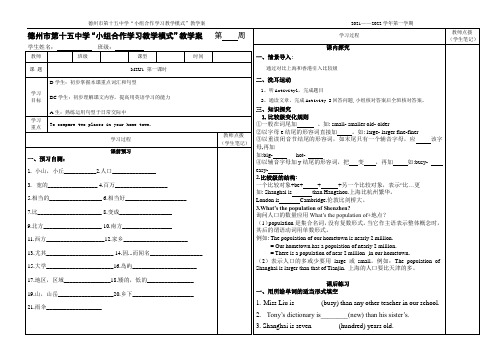
德州市第十五中学“小组合作学习教学模式”教学案第周学生姓名:班级:教师班级课型时间课题M2U1 第一课时学习目标D学生:初步掌握本课重点词汇和句型BC学生:初步理解课文内容,提高用英语学习的能力A生:熟练运用句型于日常交际中学习重点To compare two places in your home town.学习过程教师点拨(学生笔记)课前预习一、预习自测:1.小山,小丘___________2.人口_______________3.宽的_________________4.百万__________________5.相当的__________________6.相当好_____________________7.比______________________ 8.变成__________________9.北方____________________ 10.南方_________________11.西方____________________12.家乡______________________13.尤其_______________________ 14.因...而闻名__________________ 15.大学_______________________16.岛屿______________________ 17.地区,区域________________18.矮的,低的________________ 19.山,山岳___________________20.乡下_____________________ 21.雨伞___________________学习过程教师点拨(学生笔记)课内探究一、情景导入:通过对比上海和香港引入比较级二、洗耳运动1、听Activity1,完成题目2、通读文章,完成Activity 2回答问题,小组核对答案后全班核对答案。
三、知识探究1.比较级变化规则①一般在词尾加。
外研版 八年级上Module 2 Unit 1导学案(无答案)

是……的一部分be a part of一年的任何时候any time of the year
在20世纪80年代in the 1980s
要点全解
复习回顾
1.---Why didn’t your sister talk with me?
A. how to using B. what to use C. how to use
8.Please remember ________back the book to the library on time.
A. to give B. giving C. give
9.—I think we must obey(遵守)the traffic rules.
英语学科导学案
教师:学生:年级:日期:2020年月日星期:时段:
课题
《Module2Unit 1》
学习内容与过程
一、纠错与回顾
1.上节课内容回顾
2.检查预习
2、内容讲解与课堂练习、
重点罗列
必背单词
hill [hil] n.小山;小丘population [,pɔpju'leiʃən] n.(某一地区)人口,全体居民
---She is a ______girl. She is afraid to speak in front of others.
A. naughty B. shy C. clever
2.It’s difficult for your little brother ______a horse.
A. draw B. drawing C. to draw
外研版八年级英语上册教案 Module 2第一课时

第一课时Unit 1 It's taller than many other buildings.根据句子及音标提示写出单词及其汉语意思。
1.What's the population /'pɒpjʊ'leIʃn/in the city? 人口,全体居民2.The streets are wide /waId/ and straight. 宽的;_宽阔的3.What will you do if you have one million /'mIljən/ dollars? 百万4.Betty never eats junk food, so you see, she is pretty /'prIti/ healthy. 相当地;_非常;_很5.Lucy has more foreign friends than /ðən/ Lily does. 比环节1新课导入教师呈现图片并与学生一起讨论图片中的城市。
设计意图:以图片进行直观教学,能很快导入课文,还能抓住学生的好奇心;还可以让学生预先熟悉课文中出现的相关城市的背景信息,从而为理解课文作铺垫。
环节2学习活动1、21.让学生朗读活动1方框中的词汇,并说出其意思。
2.让学生根据活动1中的图片和所提供的词汇猜测听力主题,教师播放录音,学生听并补全信息,然后教师核对答案。
3.让学生小组合作整理信息,描述图片,并向全班汇报。
4.让学生合上书本,教师根据活动2的对话设计几个问题。
例如:①Where did Daming go during the weekend?②Is Shenzhen newer than Hong Kong?③Is Shenzhen getting better and better?5.教师播放活动2的录音,学生听并回答问题,然后教师核对答案。
6.教师再次播放活动2的录音,同时让学生跟读。
- 1、下载文档前请自行甄别文档内容的完整性,平台不提供额外的编辑、内容补充、找答案等附加服务。
- 2、"仅部分预览"的文档,不可在线预览部分如存在完整性等问题,可反馈申请退款(可完整预览的文档不适用该条件!)。
- 3、如文档侵犯您的权益,请联系客服反馈,我们会尽快为您处理(人工客服工作时间:9:00-18:30)。
Module 2 My home town and my country.
Unit 1 It’s taller than many other buildings. 第一课时
一、学习目标:
1. 初步掌握本课重点词汇和句型
2. 初步理解课文内容,提高有关英语学习话题的听力技能
3. 初步理解单音节形容词和部分双音节形容词比较级的用法
二、学习重点:听懂有关单音节形容词和部分双音节形容词比较级的对话,并采用它们进行简单对话
三、学习难点:掌握单音节形容词和部分双音节形容词比较级的用法
课前预习
一、使用说明与学法指导:
1. 朗读并识记单词表中本课新词汇,不会读的用红笔标记
2. 试读听力部分的单词及课文对话,初步理解对话,不会读或不能理解的用红笔标记
二、教材助读:
1. 朗读并识记听力部分的单词并根据活动预测听力内容,为听力扫除障碍
2. 朗读并理解课文对话,找出对话中出现的形容词比较级并注意读音:
tall - taller____________________________________________________________________ _____________________________________________________________________________ _____________________________________________________________________________ 三、预习自测
(一) 用英语读出并写出以下单词
4. 百万
5. 相当地;非常;很
6. 比
(二) 翻译以下短语,并把它们背下来
1. 事实上;实际上
2. 和……一样……
3. 在海岸线上
4. 想;想要
5. 某天
6. 记得做……
(三) 根据句意及首字母提示补全单词
1.My home t_____________ is smaller than Shenzhen.
2.The population of China is l____________ than any other country in the world.
3.My uncle lives in a big c_____________.
4.Hong Kong is newer t______________ Shanghai, but it’s smaller.
5.--- What’s the p__________________ of Shanghai?
--- 13 m_______________.
6.--- Is Shanghai h________________ than Hong Kong?
--- No, it isn’t. It’s colder.
7.He is b________________ doing his homework.
五、我的疑问:
_____________________________________________________________________________ _____________________________________________________________________________
课内探究
一、情景导入:
Talk about the pictures by using the words given.
二、洗耳运动完成听力部分
三、逐步完成Listen and read及后面的练习
四、质疑探究
熟读下列句子,思考讨论其中包含的语言点:
It’s taller than many other buildings.
How was your weekend?
I t’s getting bigger and busier.
Some day, it will become as busy as Hong Kong.
What’s the population of Shenzhen?
五、当堂检测
Work in groups. Make dialogues talking about your hometown and another city.
六、课后反思
_____________________________________________________________________________ _____________________________________________________________________________
课后训练
一、根据汉语提示完成句子。
1.Shenzhen is a busy city __________________ (靠近) Hong Kong.
2.--- How was your weekend?
--- _______________ (相当) good.
3.It’ll become ________________________ (和……一样繁华) Hong Kong .
4.What’s the ______________________ (人口) of China ?
5.Her father is ______________________ (超过) 50 years old .
二、合作探究
1. 熟读对话并在组内分角色朗读或进行角色扮演
2. 组内合作找出对话中比较级的句子,并勾划出比较级的单词
课后学习指导:朗读对话注意语音语调,并注意比较级的拼读。
